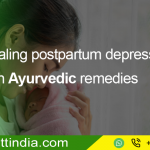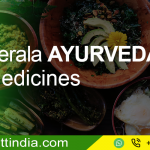An Ayurvedic Perspective to Understand PCOS: The September month is designated for the PCOS awareness event to educate the girls regarding PCOS. This blog makes people aware of the disease causes, symptoms and tips to improve their lifestyle.
Many changes happen in a woman’s body during the adolescents as the menstrual cycle starts. The good health of women is emphasized with a healthy regular menstrual cycle. These days 5-10% of females aged 18 to 44 years are experiencing menstrual abnormalities. These may include the associated symptoms like loss of hair from the sides and top of the head, excessive acne breakout, facial hair and excessive body hair.
The symptoms are collectively categorized as PCOS (Polycystic Ovarian Syndrome). When the individuals are diagnosed with the PCOS there arises fear and various questions related to the disease. PCOS emerges as one of the most complex health problems in females. This can be generally categorized as a lifestyle disorder.
The simple term represents PCOS disease caused due to the person’s lifestyle. With the help of Ayurveda, the multimodular approach is opted to treat PCOS and lifestyle-oriented disorders for maintaining a healthy lifestyle.
The Causes of PCOS
Its causes remain unidentified until now, but the ongoing researches lead several hypotheses to understand the causes of PCOS.
The proposed hypotheses are mentioned below:
- The genes play a major role in PCOS (Anuvanshik).
- Obesity – excessive accumulation of fat in the body(Sthaulya)
- Lack of exercise (Avyayam) and the Environmental factors like poor diet (Miyahara).
- Hyperinsulinemia – where the condition of insulin level is high in the blood.
- Hyperandrogenism – the condition of hormone androgen is exhibited in high-levels of the body.
The PCOS has been increased due to the changes in the lifestyle, lack of exercise and adapting to a poor diet. The cysts (granthis) in the ovaries is considered as a problem in the Artava dhatu on the grounds of Ayurveda.
Health Issues of PCOS
Besides menstrual abnormalities, the PCOS causes health issues such as :
- Type 2 Diabetes Mellitus
- Dyslipidemia
- Infertility
- Obesity
- Hypertension
- Metabolic syndrome
- Mental health disorders such as anxiety, depression, and bipolar disorders
PCOS related to Clinical terms
- Anaemia – the lack of oxygenated haemoglobin in blood
- Oligomenorrhea – condition where the menstrual cycle length is extended to more than 35days.
- Scanty bleeding and delayed bleeding.
- Irregular or prolonged menstrual pain and periods.
- Secondary Amenorrhea – the absence of menstrual bleeding from 2-3 months duration.
- Causes acne.
- Renders Oily Skin.
- Pain in the pelvic region.
- Alopecia indicates hair fall in small patches especially at the top and sides of the head.
- Hirsutism exhibits the condition resulting in the growth of dark and thick hair on the face, chest, and back.
Ayurvedic Approaches for PCOS
The direct correlation of PCOS with Ayurveda is difficult, but its symptoms related to Artavavyapad (menstrual disorders) serves the menstrual abnormalities as the main feature of PCOS.
Goals to treat PCOS are as follows:
- Panchakarma – the body detoxification process.
- Balancing and pacification of vitiated doshas through ayurvedic medications.
- Strengthening and Revitalization of the body using Ayurvedic techniques.
- Correction of Ama Dosha is caused due to bad food habits.
Some medicinal herbs are helpful in treating PCOS include as follows:
- Methi
- Aloe-vera
- Ashwagandha
- Lahsun
- Guduchi (Kaphara, Thiktha used for insulin resistance)
- Triphala
- Ashoka
- Kulathi
- Shatavari
- Shatapushpa
- Ashwagandha
The Diet And Lifestyle Modifications Recommended for PCOS
- Consume 2-3 litres of water daily.
- Have 3 main meals and 3 snacks.
- Don’t skip breakfast (have breakfast within 2 hours of waking up).
- Maintain the period tracker.
- Climb the stairs.
- Do 10 times sit up.
- Walk during the lunch break.
- Exercise 30 minutes daily as a routine.
- A healthy diet approach to follow.
- Consume fresh fruits like Apples, Bananas, berries, grapes, melon, oranges, and peaches.
- Vegetables such as Cabbage, broccoli, carrots, corn, cucumber, eggplant, mushrooms, and onion should be incorporated in daily meals.
- The quantity of meat must be restricted to once per month.
- Consume dried fruits like almonds, walnuts, raisins, dates, and cashews as a healthy snack.
- Healthy drinks such as coconut water, low-fat milk, and buttermilk should be incorporated in the diet plan.
- Avoid consumption of packaged processed foods, energy drinks, and junk food.
- Limit the usage of caffeine intake.
- Practice a good hygienic sleep.
- Restrict the overconsumption of sweets.








